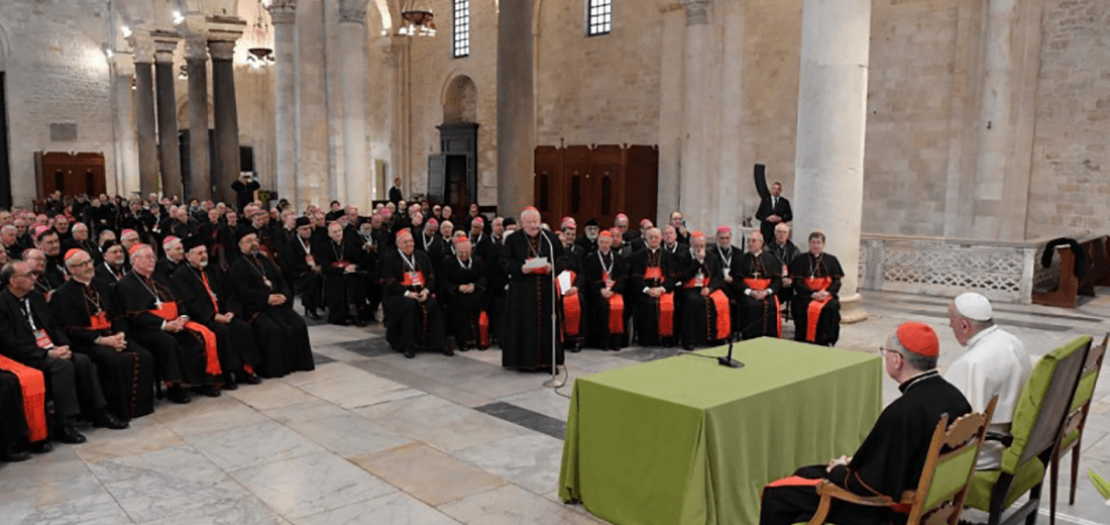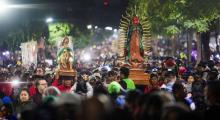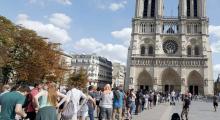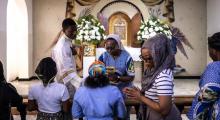Issued by the Catholic Center for Studies and Media - Jordan. Editor-in-chief Fr. Rif'at Bader - موقع أبونا abouna.org

On Sunday,February 23, Pope Francis addressed the Bishops from the Churches of the Mediterranean assembled in Bari, Italy, encouraging them in their task of reflecting “on the vocation and future of the Mediterranean”.
At the invitation of the Italian Episcopal Conference, various leaders of the Churches of the Mediterranean region have been meeting in Bari, Italy this past week. Pope Francis joined them on Sunday morning and offered words of encouragement and vision.
Vocation and future of the Mediterranean
Pope Francis characterized the gathering as one of reflecting “on the vocation and future of the Mediterranean, on the transmission of the faith and the promotion of peace”. He then noted that the process of globalization has “highlighted the role of the Mediterranean as a crossroads of interests and important social, political, religious and economic currents”.
Transmission of the faith
While the position of the countries along the Mediterranean make it a natural cultural crossroads, the Pope said that the “transmission of the faith is necessarily enriched by the heritage of the Mediterranean region”. Christian communities have kept the faith alive through catechesis, the reception of the sacraments, popular piety and art. He reminded the Bishops that the transmission of the faith “cannot be detached from commitment to the common good”, but must be connected to a tireless work as peacemakers.
Peace, not war
“It is madness to destroy houses, bridges, factories and hospitals, to kill people and annihilate resources, instead of building human and economic relationships”, Pope Francis said. It is peace, he said, that is the “ultimate goal of every human society”. The Pope continued saying “There is no reasonable alternative to peace, because every attempt at exploitation or supremacy demeans both its author and its target”. Justice, he said, is the “indispensable condition” for building peace. In fact, he stated, “Justice is trampled underfoot when the needs of individuals are ignored and where partisan economic interests prevail over the rights of individuals and communities”.
Indifference
If society becomes increasingly different to those in need, what good is its technological progress, the Pope then asked. “For our part, brothers”, Pope Francis said, “let us speak out to demand that government leaders protect minorities and religious freedom. The persecution experienced above all – but not only – by Christian communities is a heart-rending fact that cannot leave us indifferent”.
Mediterranean’s unique vocation
Pope Francis called the Mediterranean “the sea of intermingling”, and encouraged it to live up to its vocation which includes dialogue. “Dialogue alone enables us to come together, to overcome prejudices and stereotypes, to tell our stories and to come to know ourselves better”, he said. He described the act of listening as “not only an act of charity but also a way of listening to the Spirit of God who surely works in others and whose voice transcends the limits in which we are often tempted to constrain the truth”.
Theology of dialogue
Pope Francis proposed that a “theology of acceptance and dialogue” can be a means of taking steps toward incorporating not only the “truths we believe” but also other “defining points of our teaching”. This can then lead to a “renewed understanding and proclamation of the teaching of Scripture”. In the end, “Those who together dirty their hands in building peace and fraternal acceptance will no longer be able to fight over matters of faith, but will pursue the paths of respectful discussion, mutual solidarity, and the quest for unity” Pope Francis said.
Example of the Apostle Paul
In conclusion, Pope Francis entrusted his brother bishops to “the intercession of the Apostle Paul who was the first to cross the Mediterranean”. “May his example”, he said, “show you the paths to pursue in the joyful and liberating task of handing on the faith in our own time”. And he left them with a prayer inspired by the Prophet Isaiah:
“They shall build up the ancient ruins, they shall raise up the former devastations; they shall repair the ruined cities, the devastations of many generations” (Is 61:4). This is the work the Lord entrusts to you on behalf of this beloved Mediterranean region: to restore relationships that have been broken, to rebuild cities destroyed by violence, to make a garden flourish in what is now a desert, to instil hope in the hopeless, and to encourage those caught up in themselves not to fear their brothers or sisters. May the Lord accompany your steps and bless your work of reconciliation and peace.”
POPE AT MASS IN BARI: "TODAY LET US CHOOSE LOVE"
Pope Francis celebrated Mass in Bari, reflecting on the Gospel for the Seventh Sunday in Ordinary Time in his homily, encouraging that we pray for the grace to love.
Pope Francis celebrated Mass after meeting with the Bishops of the Mediterranean region gathered in Bari, Italy. During his homily, the Pope reflected on the Gospel of Matthew 5:38-48.
Jesus goes beyond
Pope Francis began his homily explaining that went beyond the “ancient law: ‘An eye for an eye and a tooth for a tooth’ ” which itself was “a sign of progress, since it prevented excessive retaliation”. By asking us to say no to violence, Pope Francis said that Jesus went “far beyond this”.
The Father loves everyone
Jesus’ words do not mean that if we practice non-violence that “the wicked will desist”, Pope Francis said. Rather, the reason why Jesus went beyond the ancient law was so because “the Father, our Father, continues to love everyone, even when his love is not reciprocated”. Jesus practiced what He preached, the Pope continued. “He did not point a finger at those who wrongfully condemned him and put him to a cruel death, but opened his arms to them on the cross”.
Extremists in loving
Jesus’ words are direct and clear and are the “only way” for those who call themselves Christian, the Pope continued. “ ‘But I say to you: love your enemies’. His words are deliberate and precise”. Jesus’ love has no boundaries, barriers, or measure, the Pope said. Yet, “How many times have we neglected that demand, behaving like everyone else!” The only extremism that Christians are allowed is the “extremism of charity” which Jesus Himself asks of us.
Pray to learn how to love
Pope Francis admitted that it is hard to love as Jesus asks us. Yet, if it were impossible, Jesus would not have given us such a commend. “By our own effort, it is difficult to achieve; it is a grace and it needs to be implored”. In addition to asking for God’s help in other things, or for favors, the Pope suggested that we “pray to learn how to love! We need to pray more frequently for the grace to live the essence of the Gospel, to be truly Christian. For ‘in the evening of life, we will be judged on love’ (Saint John of the Cross, Sayings of Light and Love, 57).
Today choose love!
In concluding his homily, Pope Francis himself used direct and precise language: “Today let us choose love”, he said. “Let us accept the challenge of Jesus, the challenge of charity. Then we will be true Christians and our world will be more human”.







